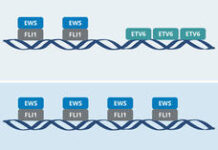Findings from a propensity-matched survival analysis presented at the ESMO Immuno-Oncology Virtual Congress 2020, held from 9 to 12 December 2020, suggest that patients with advanced melanoma and a BRAFV600 mutation derive an enhanced survival benefit from first-line treatment with anti-PD-1 monotherapy, as compared to BRAF/MEK inhibitors.
Jesper van Breeschoten of the Scientific Department, Dutch Institute for Clinical Auditing in Leiden, Netherlands and department of medical oncology Amsterdam UMC, Netherlands, explained that currently the data are inconclusive on whether to use anti-PD-1 monotherapy or BRAF/MEK inhibitors as first-line treatment in patients with advanced BRAFV600-mutant melanoma, prompting this propensity score matching study, which compared the two types of agents in this patient population.
The investigators identified patients diagnosed with unresectable stage III or IV melanoma who had a known BRAFV600-mutation and were registered in the Dutch Melanoma Treatment Registry. From 2014 to 2017, a total of 254 of these patients received first-line treatment with anti-PD-1 monotherapy and 330 received first-line treatment with BRAF/MEK inhibitors. Of these, 310 patients were matched based on their propensity scores using the nearest neighbour and the optimal matching method for inclusion in the matched cohort.
Overall survival favoured immune checkpoint inhibitor as first-line therapy for patients with BRAFV600-mutant advanced melanoma
Comparison of these two first-line treatment strategies in the matched cohort showed that patients receiving anti-PD-1 antibodies demonstrated a higher median and 12-month overall survival (OS) compared to patients treated with first-line BRAF/MEK inhibitors.
Median OS was 42.3 months (95% confidence interval [CI] 37.3-not estimable) with anti-PD-1 monotherapy compared to 19.8 months (95% CI 16.7-24.3) with BRAF/MEK inhibition in the matched cohort. The 24–month OS rates were 64.00% (95% CI 58.2-70.4) compared to 41.7% (95% CI 34.2-51.0), with the respective treatments.
Full results are accepted for publication in the British Journal of Cancer.
Conclusions
The authors concluded that these data suggest that anti-PD-1 monotherapy is the preferred first-line treatment in matched patients with BRAFV600-mutant advanced melanoma and relatively favourable patient and tumour characteristics.
They await results from currently ongoing randomised clinical studies to confirm this finding.
No external funding was disclosed for this analysis.
Reference
37P – Breeschoten JV, Wouters M, Hilarius D, et al. First-line BRAF/MEK-inhibitors versus anti-PD-1 monotherapy in BRAFV600-mutant advanced melanoma patients: A propensity-matched survival analysis. ESMO Immuno-Oncology Virtual Congress 2020 (9-12 December).







